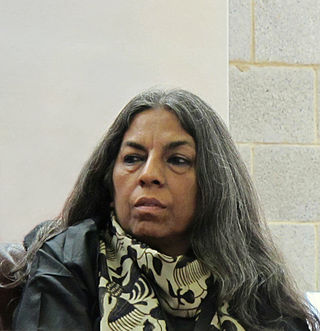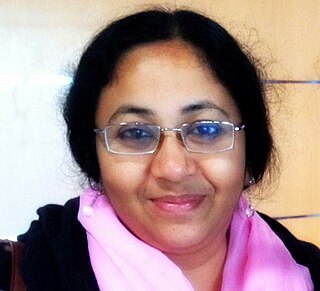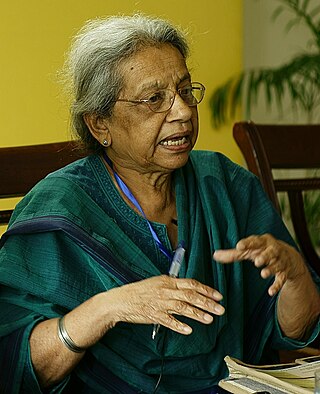
Miranda House is a constituent college for women at the University of Delhi in India. Established in 1948, it is one of the top ranked colleges of the country and ranked number 1 for consecutively seven years.

Urvashi Butalia is an Indian feminist writer, publisher and activist. She is known for her work in the women's movement of India, as well as for authoring books such as The Other Side of Silence: Voices from and the Partition of India and Speaking Peace: Women's Voices from Kashmir.
Manjula Padmanabhan is an Indian playwright, journalist, comic strip artist, and children's book author. Her works explore science, technology, gender, and international inequalities.
Baby Halder is an Indian author. Her best known work is her autobiography Aalo Aandhari (2002) which describes her harsh life growing up as a domestic worker, later translated into 21 languages, including 13 foreign languages.

The Rashtra Sevika Samiti is a Hindu nationalist women's organisation that parallels the Rashtriya Swayamsevak Sangh (RSS) for men. Even though it is often referred to as the "Sister" of the RSS, the organisation claims that it is independent of the RSS while sharing its ideology. Membership and leadership is embraced to women and its activities are directed to nationalist devotion and mobilisation of Hindu women.
Kali for Women was a start-up feminist publisher in India. Urvashi Butalia and Ritu Menon set up Kali for Women in 1984, arguably the first Indian publishing house dedicated to publishing on and for women. When they decided to take this step, Butalia had worked with Oxford University Press and Zed Books in Delhi, while Ritu Menon was a scholar. They started with very little capital but with an urgent sense that they had to make Indian women's voices heard, through academic publishing and activist works, translation and fiction. They were followed by other Indian presses concerned with gender and social issues, such as Bhatkal and Sen who publish the imprints Stree and Samya and Tulika Books.

Ilavenil Meena Kandasamy is an Indian poet, fiction writer, translator and activist from Chennai, Tamil Nadu, India.

Temsüla Ao was an Indian poet, fiction writer, and ethnographer. She was a professor of English at North Eastern Hill University (NEHU) from where she retired in 2010. She served as the director of the North East Zone Cultural Centre between 1992 and 1997 on deputation from NEHU. She was awarded the Padma Shri award for her contribution to literature and education. Her book Laburnum For My Head received the Sahitya Akademi Award for English writing in the short story category. Her works have been translated into Assamese, Bengali, French, German, Hindi, and Kannada.
Anil Menon is an Indian computer scientist and writer of speculative fiction. He has authored research papers and edited books on evolutionary algorithms. His research, in collaboration with Kishan Mehrotra, Chilukuri Mohan, and Sanjay Ranka, addresses the mathematical foundations of replicator systems, majorization, and reconstruction of probabilistic databases. His short stories and reviews have appeared in the anthology series Exotic Gothic, Strange Horizons, Interzone, Lady Churchill's Rosebud Wristlet, Chiaroscuro, Sybil's Garage, Apex Digest, and others.
Ritu Menon is an Indian feminist, writer and publisher.

Jayakumari Devika is a Malayali historian, feminist, social critic and academic from Kerala. She currently researches and teaches at the Centre for Development Studies, Thiruvananthapuram as a professor. She has authored several books and articles on gender relations in early Kerala society. She is bilingual and has translated both fiction and non-fiction books between Malayalam and English. She also writes on gender, politics, social reforms and development in Kerala on publications like Kafila, Economic and Political Weekly and The Wire.
Aalo Aandhari is the autobiography of Baby Halder, a domestic worker who battled poverty, hardship, violence and after a lot of struggle finally managed to make a name for herself as a writer. The book traces Baby's difficult life since she was abandoned by her mother and left with a cruel, abusive father at a very young age. Married at twelve to an abusive man twice her age and a mother at fourteen, her life was marked by overwhelming challenges. Exhausted and desperate, she fled with her three children to Delhi, to work as a maid in some of the city's wealthiest homes. Expected to serve her employers' every demand, she faced a staggering workload that often left her no time to care for her own children.

Uma Chakravarti is an Indian historian and filmmaker. Beginning in the 1980s, Chakravarti wrote extensively on Indian history highlighting issues relating to gender, caste, and class, publishing seven books over the course of her career. Her body of work mostly focused on the history of Buddhism, and that of ancient and 19th century India.
Towards Equality was the title of the report of the Committee on the Status of Women in India (1974–1975). This 1974 document is said to lay the foundation of women's movement in independent India, highlighting discriminatory sociocultural practices, political and economic processes. The findings of the report reopened the women's question for government, academia and women's organisation. Its authors included Vina Mazumdar and Lotika Sarkar, who later founded the Centre for Women’s Development Studies in Delhi.
Wajida Tabassum was an Indian writer of fiction, verses and songs in the Urdu language. She wrote 27 books. Some of her stories have been made into movies and Indian television serials. Her controversial 1975 story titled "Utran" was made into a popular soap opera on Indian television in 1988. "Utran" was reprinted in English translation as part of an anthology of 20 short stories titled Such Devoted Sisters in 1994, and from there was made into a movie in 1996 under the title Kama Sutra: A Tale of Love, with a script by Mira Nair and Helena Kriel.
Anupama Jain is a writer and teacher based out of Gurgaon, India. She is the founding member of Senior School Moms and a blogger. Anupama is the author of 4 well-received books and 12 anthologies across genres, one of which is a LIMCA record holder as India’s first Composite Novel. She is an acclaimed community builder, mentor, and multi-award-winning blogger who pens on the vagaries of the quirky world across various coveted forums.
Priya Sarukkai Chabria is an Indian poet, translator and novelist writing in English, and a curator. She has written four poetry collections, two speculative fiction novels, translations from Classical Tamil, literary nonfiction, and a novel. She has edited two poetry anthologies. She is also founding editor of Poetry at Sangam, an Indian online literary journal of poetry.
The Kolkata Partition Museum is an initiative dedicated to documenting the Partition of India from the Bengal perspective. Dissimilar to the Punjabi context, the Bengal province had been divided twice: once in 1905, and then in 1947. The aftermath of the second partition, as recorded by many historians, unfolded distinctly in postcolonial Bengal vis-à-vis Punjab. Not only was the impact long-drawn and can be witnessed even 75 years after the Partition, its affect can also be seen in the neighbouring states of Bengal and the rest of the country owing to refugee resettlements spread out to as far away states such as Maharashtra and Chhattisgarh. The idea behind the Kolkata Partition Museum is to preserve and present the vanishing memories of partition, to emphasise both the "rupture and continuities between West Bengal and Bangladesh – in terms of language and literature, food, fabric, and the performing arts – and to encourage collaboration between them." The museum aims "to do so by involving public participation in its programs and gearing all its activities in a way that makes it more accessible and interesting to the public at large."







